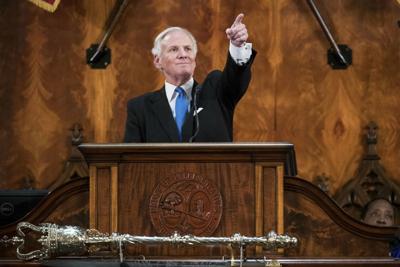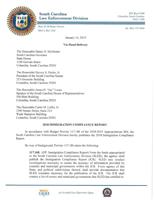COLUMBIA — It took nearly 600 documents, hundreds of signatures from local officials and hours of work by law enforcement personnel to tell South Carolina's leaders what they admittedly knew: the state doesn't have any so-called sanctuary cities.
The State Law Enforcement Division compiled a nearly foot-tall stack of paperwork in January to comply with a law requested by Gov. Henry McMaster to verify that local governments and police agencies weren't flouting the state's immigration-related laws.
Nobody had any reason to believe they were.
But McMaster and the Republican-led Legislature altered the budget last year to crack down on the perceived threat. They pushed to cut off state funding to any city or county that didn't properly check people's immigration status when they are processed into local jails or if they are applying for a public benefit, service or license.
It didn't matter that state law already allowed residents to file a civil lawsuit against their local government if they weren't complying.
The demand stemmed from the national debate over so-called sanctuary cities — local governments that don't assist the U.S. Department of Homeland Security in setting up a dragnet for undocumented immigrants.
To follow through on the orders, South Carolina law enforcement officials had to obtain signatures from mayors, sheriffs, county managers and city police chiefs — anyone who could attest that they were not ignoring the immigration procedures.
The list included South Carolina's 46 counties and every municipality in the state, from the city of Charleston to the tiny town of Smyrna with its 45 residents.
The hunt didn't turn up anything in the end. The SLED report says none of South Carolina's local governments are attempting to negate the work of federal immigration agents.
Still, the governor's office believes the paperwork serves as a deterrent to local officials who might choose to relax the checks on undocumented immigrants.
“This is exactly why Gov. McMaster pushed for this legislation,” said Brian Symmes, the governor's spokesman. “The people of South Carolina have the right to know from their state and local officials that they are following the law.”
Critics see it differently. They believe the effort was nothing more than political posturing and campaign fodder for McMaster, a Republican who survived a highly contested primary election last year.
State Rep. Micah Caskey, R-West Columbia, opposed McMaster's proposal to have state law enforcement officials collect the paperwork last year. He argued it was a bureaucratic waste of time and a "solution in search of a problem."
But in an effort to compromise, he suggested giving the state attorney general the ability to sue local governments that don't fall in line with immigration laws. The Legislature didn't go for that.
"My thoughts on it really haven't changed at all. It's as silly today as it was last year when people insisted on having this," Caskey said. "I think we should try to make government less dumb and this shows we are not even capable of that."
"I predict we won't hear much about this until the next elections swing around," he added.
There's no denying the value the issue held on the campaign trail. It allowed McMaster to market himself as a governor who was cracking down on undocumented immigrants, and it enabled him to whip up support from Republican voters.
McMaster's opposition to illegal immigration was highlighted in some of the political commercials that ran on television. He personally referenced the effort to root out sanctuary cities during a televised primary debate. And McMaster's campaign devoted an entire page of his website to the hot-button issue.
"Liberals want Sanctuary Cities in South Carolina. We must stop them," the website said before asking for people's names and email addresses.
McMaster's actions even landed him a coveted interview on the Fox News Channel less than two weeks before the general election.
“How many cities do you think are going to be a problem on this? How many Rahm Emanuels do you have in South Carolina?" asked Fox and Friends host Brian Kilmeade, referencing Chicago's former Democratic mayor.
“Oh, I don’t think we are going to have any problem at all. And I don’t think we have a problem now," said McMaster, admitting the search for sanctuary cities would be fruitless. "But I know some other cities around the country — New York, Philadelphia, Chicago, San Francisco and a lot of others as well.”
House Minority Leader Todd Rutherford, D-Columbia, believes South Carolina focuses far too much attention on undocumented immigrants.
He cited the state's small Immigration Enforcement Unit, which The Post and Courier investigated last year. It cost the state more than $5 million primarily to surveil and arrest Hispanic immigrants who use fake identifications to get jobs.
Rutherford said the paperwork that SLED collected in January is a needless drain on state resources.
“South Carolina is wasting money to find out what everyone else already knew,” Rutherford said.








